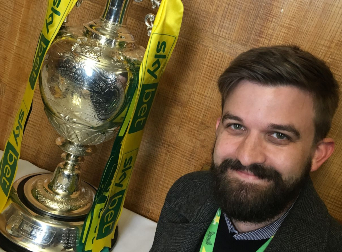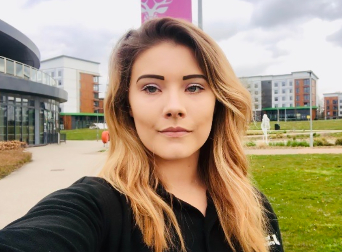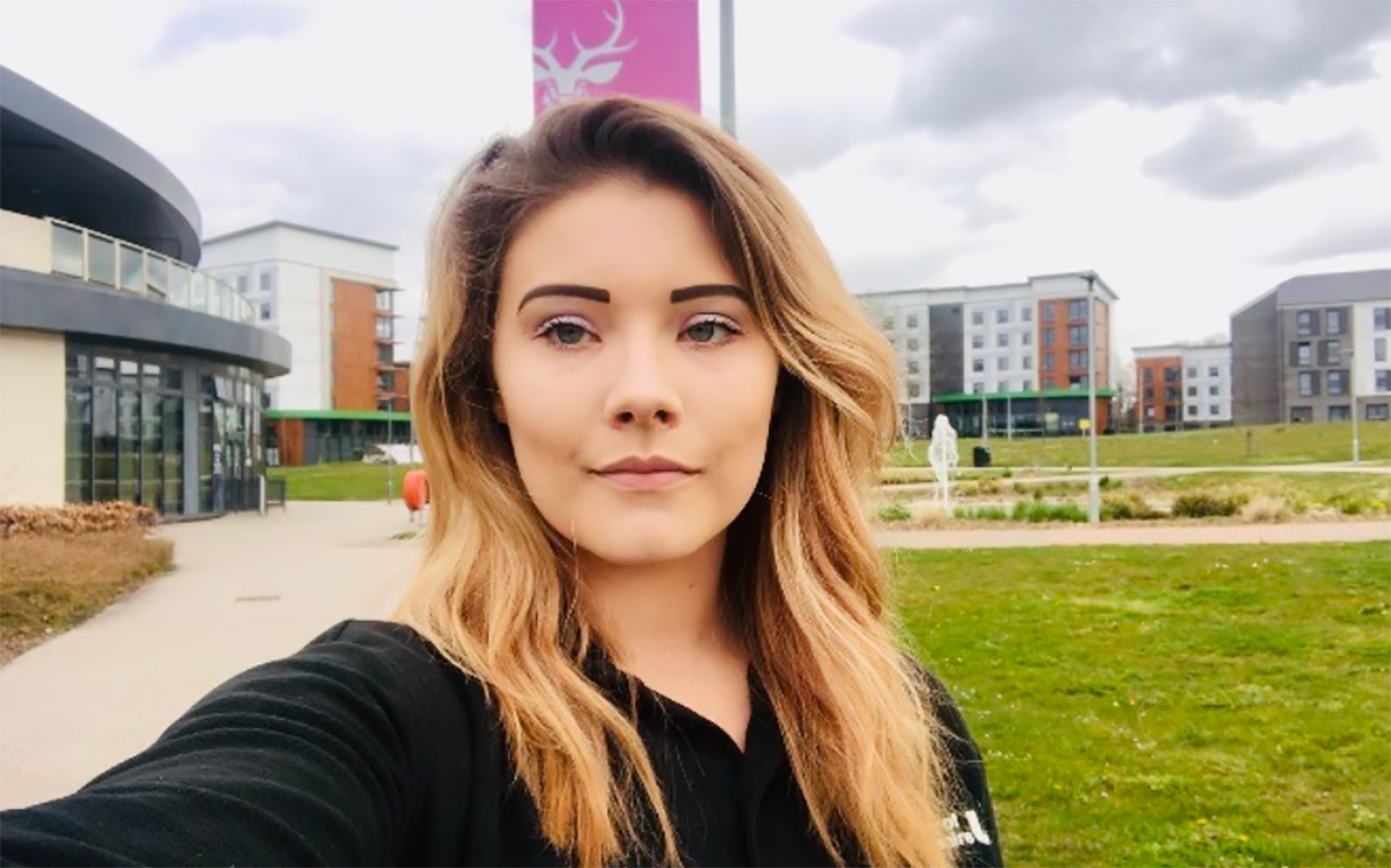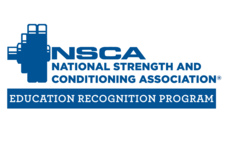BSc (Hons) Sports Therapy
Key information
-
Typical offer:
Entry requirements -
Fees: See below
Full details -
UCAS code: CB63
-
Institute code: H36
-
Study abroad option
-
Work placement option
Find out more
Why choose this course?
- 2nd in the East of England for Sports Science (2023 Complete University Guide)
- Get real life clinical practice in our sports injuries clinic
- Gain a year’s clinical placement with a professional sports team
- The degree in Sports Therapy is an ideal course for those who wish to train in the prevention, assessment, treatment and rehabilitation of sporting injuries.
- We offer a sandwich year enabling you to go on a full year placement to gain invaluable clinical experience with professional sports teams, either within the UK or overseas.
- Graduates are eligible for full membership with the Society of Sports Therapists.
- We have specialist labs for: Physiology, Biomechanics and Sports Therapy. You can also make use of the University’s Hertfordshire Sports Village at the de Havilland campus.
Additional opportunities include:
- Visits to observe human dissections
- Massaging at events such as the London Marathon
- Presenting research at national conferences
- First aid cover at events
- Sandwich Year and Work Placement opportunities
- Use of The Clinical Simulation Centre within the Sports Trauma Management module, a state-of-the-art facility which provides a realistic environment where necessary skills can be practiced
- Personal tutor scheme
- First Aid at Work Certification
- Level 2 Fitness Instructor Additional Course
- Opportunities to support research
Find out more about our sports staff.
We are thrilled to announce our official partnership with Watford FC for the 2024-25 season. As a Herts student, you will have exclusive access to a variety of unique career and educational opportunities with this prestigious football club. Find out how you can get involved.
What's the course about?
This course gives you the latest skills needed to work in the cutting-edge field of sports therapy. You’ll learn how to assess injuries, apply treatments (such as sports massage, electrotherapy and joint mobilisation), learn pitch-side injury management and design injury prevention and rehabilitation programmes..
You’ll also study the underpinning theory of practice: anatomy, clinical biomechanics, exercise physiology, sports nutrition and psychology. Our students enjoy access to specialist labs and high-tech facilities, such as our dedicated sports injury clinic, and take valuable clinical placements in a diverse range of sport and exercise environments.
Your main campus is de Havilland
You’ll share this campus with students from business, law, sport, and education subjects. The student housing is close to our Sports Village which includes a gym, swimming pool and climbing wall. You can get breakfast, lunch, or dinner in our on-campus restaurant or bar (in the newly built Enterprise Hub) on days you don’t feel like cooking. You can also use the common room to play pool, video games or just to hang out with friends. Our Learning Resources Centres are open 24/7, which means you can study whenever suits you best. Want to pop over to the other campus? You can take the free shuttle bus or walk there in just 15 minutes.
What will I study?
Due to the nature of Sports Therapy, each module has both theoretical and practical components. You will learn through a variety of lectures, practical classes, workshops, tutorials and clinical placements. Our lectures are interactive and encourage applying theories to relevant real life situations, and in the practical classes you will learn your clinical techniques. During workshops your skills are put into problem solving and sports specific scenarios, and individual tutorials enable you to discuss areas of your choice. Along with clinical placement, in your own time you will be directed towards the university's vast learning and research resources for independent study.
As everybody learns differently, methods of teaching and assessment are varied. Modules may require written coursework, practical assessments, and written exams at the end of each semester. Some modules also have oral presentations, group work, portfolios, and poster sessions to ensure that all key skills of the graduate Sports Therapist are evidenced.
On the full time programme, you will study four modules at a time. Each module typically consists of four hours contact time per week, with further reading, research and coursework completed independently. On the part time programme, the course structure is considered on an individual basis with the Programme Tutor, depending on your needs and other commitments.
Clinical placements are completed in your own time, allowing flexibility to gain experience during usual working hours, at evenings or weekends, and during University vacations if preferred. Extensive extra-curricular opportunities are encouraged to supplement your standard programme. Visits and excursions to develop your skills and experience are offered, along with short courses and qualifications including first aid and fitness instructor qualifications.
Part-time study
If you are studying part-time you have 6 years to complete your course. You will complete 60-90 credits per year. All modules are compulsory, there are no options. Your timetable will depend on which modules you pick. Certain modules must be passed at each level before progression onto higher level clinical modules.
During my placement year I was not only exposed to elite athletes but also elite coaches and performance staff. I had the opportunity to learn from the staff and to broaden my understanding not only within the rehabilitation setting but throughout the whole training programme. I was able to get hands on experience from the start, whether that was inside the gym, by the pool with an injured player, outside on the field or pitch-side on game nights. I was able to see the backbone to a premiership winning team, this placement went far beyond any expectation I had and was an experience like none other.

Alumni Stories
Gavin Beard
Meet Gavin Beard who has taken his love for sports into industry. Since graduating he has worked his way up the career ladder and is now the Head of Marketing for Norwich Football Club.
Read more stories| Current job role | Head of Marketing |
|---|---|
| Year of graduation | 2013 |
| Course of study | BSc (Hons) Sports Studies |

More than a degree
Gavin graduated from the University of Hertfordshire with more than a degree; his university experience helped him to gain valuable insight to several disciplines and allowed him to narrow down his career choices.
He says, 'My degree allowed me to study various disciplines, including coaching, science and business. Having exposure to these different areas helped me understand what I favoured, and it was clear that business (and in particular, marketing) was an area I felt I could forge a career in.'
After successfully completing his degree Gavin began moving up the career ladder, working at many well respected companies such as Coral, BT Sport and currently Norwich City Football Club. Gavin puts a lot of his success down to the degree he studied and the support provided by the university.
He comments, 'The variety of modules and the exposure to different disciplines within my course were extremely useful. This was crucial in helping me determine my path. After year one, I knew I liked marketing, so I worked with the ERASMUS team to find a pathway to help me study this abroad. I then studied business in Valencia for a year and it was an experience I’ll never forget.'
Aspirations for the future
Gavin is still really enjoying his career in leading the Marketing team at Norwich City Football Club. He says, 'It’s an incredibly varied role; one day I could be leading the campaign to promote the new kit, the next it’ll be marketing the Take That gig at Carrow Road!'
Gavin is hopeful for the future and says 'Given my experience, my future roles will continue to be in marketing, hopefully I will help Norwich to become an established Premier League team. Then who knows!'

Alumni Stories
Annabelle Bullock
Meet Annabelle Bullock, a BUCS gold medallist, who studied Sports Studies alongside her athletic pursuits. As an athlete she competed in target shooting and as a member of the women's Lacrosse team.
Read more stories BSc (Hons) Sports Studies MA Education| Current job role | Education Liaison Coordinator |
|---|---|
| Year of graduation | 2018 / 2019 |
| Course of study | BSc (Hons) Sports Studies |
| MA Education |

University experience and support
The University supported Annabelle by making her one of its sponsored athletes providing her with greater flexibility and access to sporting facilities and opportunities. This helped her develop a broad and transferable set of skills and experience.
Annabelle says, 'Being an athlete and studying was challenging, but the University and my lecturers were so supportive. Being made a sponsored athlete also came with a bunch of perks. All this support and the opportunities that the University provided helped me to build the skills and confidence I needed to be truly successful in my job today.'
Annabelle currently works as one of the Education Liaison Coordinators at Herts. Having established fantastic contacts within the University, her student activities meant she could seamlessly progress into a professional role that complimented many of her skills and interests.
'I always assumed that I would do something within sport, but when it came to my final year in BSc Sport Studies, I had found my passion for Coach Education. During my MA in Education at the University, I discovered another passion for helping others and working with student athletes.'
Opportunities to explore
The University is committed to recognising talent in its students and offering any exciting opportunities that can enrich their studies and further their careers. Annabelle's lecturers' encouraged her to explore her passion for research which inspired her to continue with postgraduate study. Most impressively, the University helped her win its first BUCS gold medal in target shooting, which she says 'felt amazing as I was the only one in the team!'
Annabelle's advice for new and current students is to 'Do things that are out of your comfort zone because the skills and experiences you develop may just be the thing that your employer is looking for. Take all of the opportunities you can. I thought I was going to be an athlete forever, then I discovered coaching. I am very lucky that my first "proper" job is something that I absolutely love but I am still able to continue coaching. This summer I am helping coach a target shooting national team in the biggest junior, under 21, competition in the country.'

